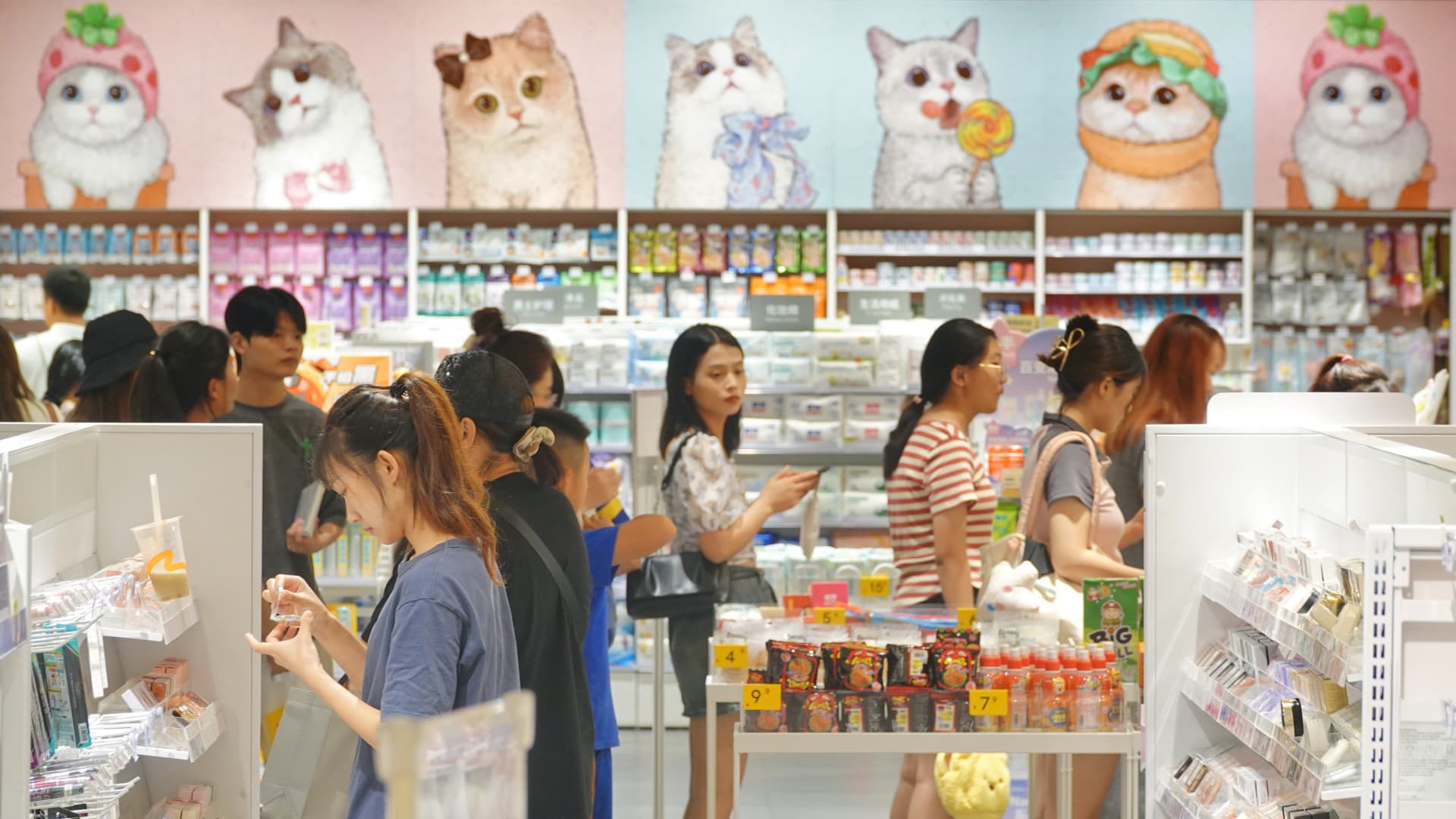Consumers shopping at a mall in Yantai, East China’s Shandong province, July 10, 2023.
Future Publishing | Future Publishing | Getty Images
Min Li doesn’t go to the mall often. But when she does, she heads straight for the basement, scurrying past the first floor flanked by Gucci, Chanel, Louis Vuitton and other luxury outlets.
“The first floor is too expensive,” the 26-year-old says. She’s got company.
Chinese young people are increasingly shopping and dining at the basement units of malls, a trend the social media has labeled the “B1B2” economy.
The basement floors — B1, B2 — typically house low-cost gift and souvenir shops, apparel outlets, the supermarket, and other relatively affordable consumer product stores like Miniso and Luckin Coffee.
“Landlords try to put anchor tenants like LV, Apple or Starbucks on pricier real estate on the ground or first floor,” says Shaun Rein, managing director of China Market Research Group. Historically, higher-end shops have attracted more footfall, but China’s weak economy means the cheaper brands are now drawing the crowds, he adds.
The name of the game for Chinese youth in 2024 is trading down. Instead of Starbucks, youth are buying Luckin coffee.
Shaun Rein
managing director of China Market Research Group
The hashtag “#Young people only go shopping at B1B2” has been trending recently on Chinese social media platform Weibo.
The reply to a Weibo user’s post on how she and her peers usually go straight to the basement floors for shopping captures the mood of the Chinese youth: “Everything we can afford is underground!”
Anything not in the basement floors is considered to be “in heaven,” signaling it’s out of reach.
Citizens shopping for Mid-Autumn Festival gifts at a shopping mall in Yantai, East China’s Shandong province, Sept 25, 2023. (Photo credit should read CFOTO/Future Publishing via Getty Images)
Future Publishing | Future Publishing | Getty Images
“The name of the game for Chinese youth in 2024 is trading down. Instead of Starbucks, youth are buying Luckin coffee,” Rein says.
Slowdown bites
China’s economic rebound since emerging from Covid has been sluggish, with Moody’s cutting the country’s credit outlook to “negative” on Tuesday. Lackluster consumption has fueled the “B1B2” trend.
“A lot of China’s youths are struggling to find a stable job, or earning sufficient money to support a decent life for themselves,” says Jia Miao, an assistant professor of sociology at the New York University Shanghai. They are compelled to save more, she adds.
In June, a survey found that the average monthly salary of those with undergraduate degrees earned 5,990 Chinese yuan ($845.04) in 2022.
The survey — conducted by MyCOS Research, which is funded by the state-owned investment company, Citic Industrial — noted that only 6.9% drew a starting monthly salary of more than 10,000 yuan ($1,410.76).
People just feel the future is uncertain … I don’t think the situation can change anytime soon.
Jia Miao
Assistant professor of sociology, NYU Shanghai
China stopped releasing youth unemployment figures since August, after a streak of record-high numbers.
“Before, young people [could] afford to buy some luxuries by using six months of their salary. But now even if they want to use [that] six months, they cannot buy the thing they want anymore,” says Chung Chi Nien, a chair professor at Hong Kong Polytechnic University.
China’s consumer spending growth is expected to slow further, with the country’s retail sales remaining lackluster since the onset of the Covid pandemic in 2020, according to a McKinsey report.
Online shopping behemoths Alibaba and JD.com, for a second-straight year, declined to share total figures for China’s biggest annual shopping extravaganza, the Singles Day.
Miao says a higher number of Chinese choosing to remain single also means more people are eating alone — and often that means opting out of fine dining at restaurants six to seven floors up in a mall.
While bargain basements can largely be found in shopping centers across suburban areas, for select malls in tier-1 cities such as Shanghai and Guangzhou even stores in the basement floors are considered expensive, she adds.
Chinese customers shopping for cosmetics.
China News Service | China News Service | Getty Images
China’s main mall operator, Wanda Group, did not respond to CNBC’s request for comment.
“People just feel the future is uncertain … Young people have to adjust themselves to the current economic situation for probably several years,” Miao says.
Min says she and her friends occasionally wander to the third and fourth floor of malls where other relatively less expensive clothing brands are housed. There, they will put on the clothes, give it a twirl — only to put them back on the rack and look for cheaper alternatives online.
“I think the future isn’t that hopeful, but we still work very hard to get what we want,” she says.
“In China here, most of us, and to be honest, everyone, feel the pressure caused by the economy, Covid, and the large amount of aged population,” she adds.
— CNBC’s Ulrica Lin contributed to this report.
Don’t miss:
